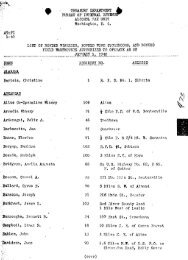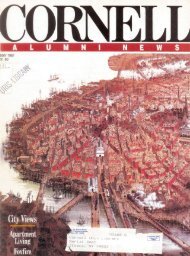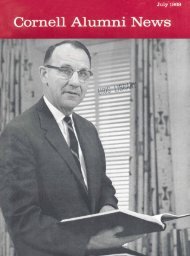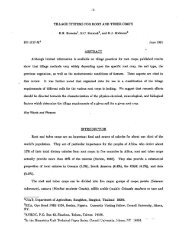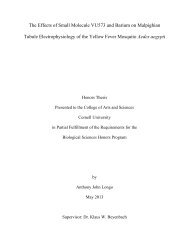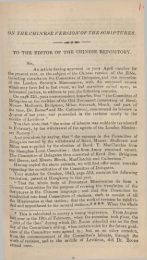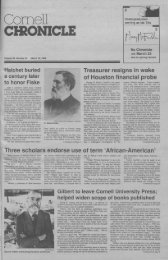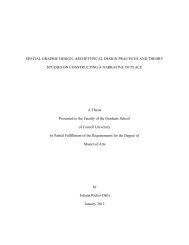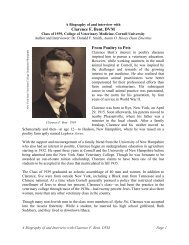Peru: you'll never see more species! - eCommons@Cornell - Cornell ...
Peru: you'll never see more species! - eCommons@Cornell - Cornell ...
Peru: you'll never see more species! - eCommons@Cornell - Cornell ...
Create successful ePaper yourself
Turn your PDF publications into a flip-book with our unique Google optimized e-Paper software.
ing last year's prices on my little pad.<br />
The white slips that were presented to<br />
Pop did not reflect the nickle and dime<br />
increases over the previous year. But<br />
since I was green and it my first meal I<br />
was allowed to survive.<br />
For three hours of service you were<br />
paid three meals. Each waiter worked a<br />
half hour at breakfast, an hour at noon,<br />
and an hour and a half during the evening<br />
shift. You could order anything on<br />
the menu except the expensive items like<br />
steak. Some of the whitecoats ate before<br />
their shift, some upon finishing. The<br />
shifts were staggered, especially for the<br />
evening meal when the tumult was highest.<br />
It was the evening meal that took your<br />
breath away. For about an hour, around<br />
6 p.m., every seat was taken and a line<br />
waited to be seated. The friendly bedlam<br />
constantly assaulted your ears. The waiters<br />
produced a steady flow of blurred<br />
white as they streamed in and out of the<br />
kitchen. The eaters contributed to the<br />
dissonance with laughter and loud talk.<br />
The talk had to be loud to be audible.<br />
Mom watched her dining room with<br />
quick eye and quicker tongue if you<br />
failed her standards.<br />
Of the two bosses, Mom was the most<br />
gentle. Her voice had a sharpness to it<br />
but she rarely needed to use it. Pop, on<br />
the other hand, had a mild soft voice but<br />
from under his moustache severe words<br />
could issue if the occasion demanded.<br />
Once one got into the routine it was easy<br />
work, if hectic. Three meals for three<br />
ing in every sense of the word. There<br />
were few instructions. I was shown the<br />
drawer where the rolls were kept, where<br />
the beverages were, the butter, and desserts.<br />
I had eaten there the previous year<br />
which <strong>see</strong>med to be sufficient qualification.<br />
The sequence was simple enough. You<br />
wrote down the order from the customer<br />
and took the white slip to the kitchen<br />
where the cooks filled the plate. Then,<br />
sometimes with several plates piled on<br />
your left arm and two in your right<br />
hand, you steamed into the dining room.<br />
The two plates in your right hand were<br />
placed on the table and the contents of<br />
the left arm dealt like cards to the appropriate<br />
customers. Rolls and beverage<br />
were deposited with little fanfare. Sheldon<br />
Court did not stand on ceremony.<br />
Get them in and out as fast as you can<br />
was the primary rule.<br />
The bustle and confusion was the<br />
same as the year before and I soon was<br />
immersed in taking and delivering orders.<br />
I failed to look carefully at the<br />
menu and was hauled on the carpet during<br />
the middle of the meal. I was charg-<br />
30 CORNELL ALUMNI NEWS<br />
'Get to know<br />
the cooks'<br />
proves a rule<br />
in peace and<br />
wartime, too<br />
hours made a substantial contribution to<br />
the budget.<br />
As the evening wound down so did the<br />
manic frenzy of food dispensing. By<br />
7:30, certainly by 8, there were <strong>more</strong><br />
waiters than customers. Informality was<br />
the word. If there was no one to wait on,<br />
you sometimes sat in a booth with<br />
friends, always keeping an eye on the<br />
door should an unfed customer arrive. If<br />
one arrived and a waiter was not by his<br />
side as he sat down Pop's steely eyes<br />
would put you on your feet.<br />
Among the college crowd, tips ranged<br />
from unknown to nonexistent and they<br />
were not expected. However, occasionally<br />
a stranger, an outlander as it were,<br />
did leave a tip. These occasions were<br />
most likely to occur on a weekend when<br />
some university function brought the<br />
strangers to Ithaca. One big football<br />
weekend, I think it was the Ohio State<br />
game, one of the whitecoats suggested<br />
we pool any tips so all could share. It<br />
was agreed and all tips were deposited in<br />
a small tea pot. As I remember I got two<br />
25-cent tips, which went into the pot.<br />
The following Monday the pot was divided<br />
and my dividend was 15 cents. So<br />
much for high finance.<br />
An avid whistler, I was somewhat apprehensive<br />
one evening when I caught<br />
myself whistling as I delivered the<br />
mounds of food to my tables. No comment<br />
was forthcoming so I cautiously<br />
continued with my music. The informality<br />
was such that the whistling fitted<br />
right in. Soon most of the whitecoats<br />
were filling the steaming, smoky air with<br />
snatches of the popular songs String of<br />
Pearls, Mairzy Doats, Dipsy Doodle,<br />
and the like.<br />
While the cooks were gruff, underneath<br />
they were gentle souls. Exposure<br />
to years of college-type waiters had covered<br />
them with a steel crust. Once one<br />
penetrated this armor the kitchen was a<br />
different place. It was here that I learned<br />
a very important rule for surviving institutional<br />
life: "Get to know the cooks."<br />
Little did I know that within a few short<br />
months I would put this survival technique<br />
to good use in the military.<br />
I soon became friends with these regal<br />
masters of the kitchen. If I had a customer<br />
with a special request they would do<br />
what they could to satisfy it. After several<br />
weeks I was told, or rather ordered, to<br />
tell them when the plate they were filling<br />
was my meal. I became the recipient of<br />
substantial helpings of potato and vegetable.<br />
If there was an extra large pork<br />
chop in the oven it might find its way to<br />
my plate. An extra slice of meatloaf<br />
might be hidden under the mashed potatoes.<br />
Often they advised me as to what was<br />
good on the menu for that meal or even<br />
<strong>more</strong> important what was not so good.<br />
It was a pleasant and rewarding arrangement.<br />
I have fond memories of those unpolished<br />
diamonds.<br />
The Monday after Pearl Harbor<br />
brought a drastic change at the Sheldon<br />
Court Restaurant. The usual dissonance<br />
disappeared. There was noise but it was<br />
not the boisterous, raucous blast of previous<br />
days. Even the air was different.<br />
The steamy, smoky, haze cleared. Every<br />
corner was visible at a glance. The whitecoats<br />
still delivered their wares swiftly<br />
and with dispatch but a seriousness crept<br />
into their talk and movements.<br />
Within months, the whitecoats and<br />
the diners they served disappeared from<br />
the campus to disperse to far corners of<br />
the world, some <strong>never</strong> to return. And the<br />
Sheldon Court Restaurant closed its<br />
doors.



